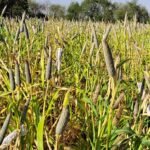By Murimi Gitari, August 2, 2023, The International Potato Center (CIP) in partnership with Kenya Agricultural and Livestock Research Organization (KALRO) have released a new sweet potato variety, the KC Sweet that is climate-resitant and nutritious in an effort to tackle ongoing climate challenges facing farmers in Kenya.
Originally known as TU-82-155, the purple-fleshed variety made its way to Kenya from Ghana in 2018. It is well embraced by farmers in Ghana, where it was released by Savanna Agricultural Research Institute (SARI) as ‘SARI-DIEDI’. Diedi means “collect and eat” in the Dagbanli language in Ghana, a phrase resonating with the joy of collecting and enjoying the harvest.
Recognizing its immense potential in contributing to food and nutrition security, CIP and KALRO collaborated to bring this game-changing variety to Kenya, where it was then known as ‘TU-PURPLE’. To ensure its reliability and performance in different agroecologies, the purple-fleshed variety has undergone rigorous testing through the National Performance Trials, a collaborative effort by KALRO and CIP. After proving its exceptional qualities including taste, nutritional value, and high yield, this extraordinary variety has now been officially released in Kenya, under the name ‘KC-SWEET PURPLE’.
This climate-resilient sweet potato variety allows farmers to adapt to changing environmental conditions, ensuring food security, and maintaining their livelihoods. The areas noted for optimal production of ‘KC-SWEET Purple’ are dry land areas in Eastern Kenya, Makueni, Machakos, Kitui, and Tharaka Nithi. Additionally, potential areas are Siaya, Alupe, Embu, and Kakamega and Coastal areas at Taita-taveta, and Kwale. According to data obtained from the National Performance Trail, ‘KC Sweet Purple’ has a maturity period of 120 – 150 days and a yield of 15.74t/ha.
The variety is erect plant type with light green leaves when young and green leaves when mature. It has green veins at the top and under surfaces with triangular very slight lobes with green vines with thick short internodes. The flowering ability and habits are early and highly profuse. ‘KC Sweet Purple’ has a potential storage root yield of 25t/ha. It has good adaptability as it’s widely spread. It is also resistant to pests like sweet potato weevils and is tolerant to Sweet potato virus disease. It has long elliptic-shaped roots, with dark purple skin and flesh and dray matter is 27.9%. The roots remain dark purple when boiled which is appealing to children and adults. It has a moderately sweet taste and a dry–floury texture when boiled.
The food processing industry is keen to use the variety as a healthy food additive and a potential source of natural food colorant due to its high levels of anthocyanin. Anthocyanin in our bodies is known to have antioxidant capacities. It is also rich in beta-carotene and other minerals like Iron and Zinc. The joint efforts of CIP and KALRO in developing ‘KC Sweet Purple’ continues to highlight the importance of collaboration and knowledge sharing in addressing climate change challenges for higher yields.
Clean planting material can be sourced from Kenya Agricultural Livestock Research Institute (KALRO) Kiboko. Decentralized vine multipliers registered under JUA Sustainable African company limited based in Bungoma; Kenya Plant Health Inspectorate Services, Muguga for those who may be interested in buying pre-basic seed for further multiplication.







